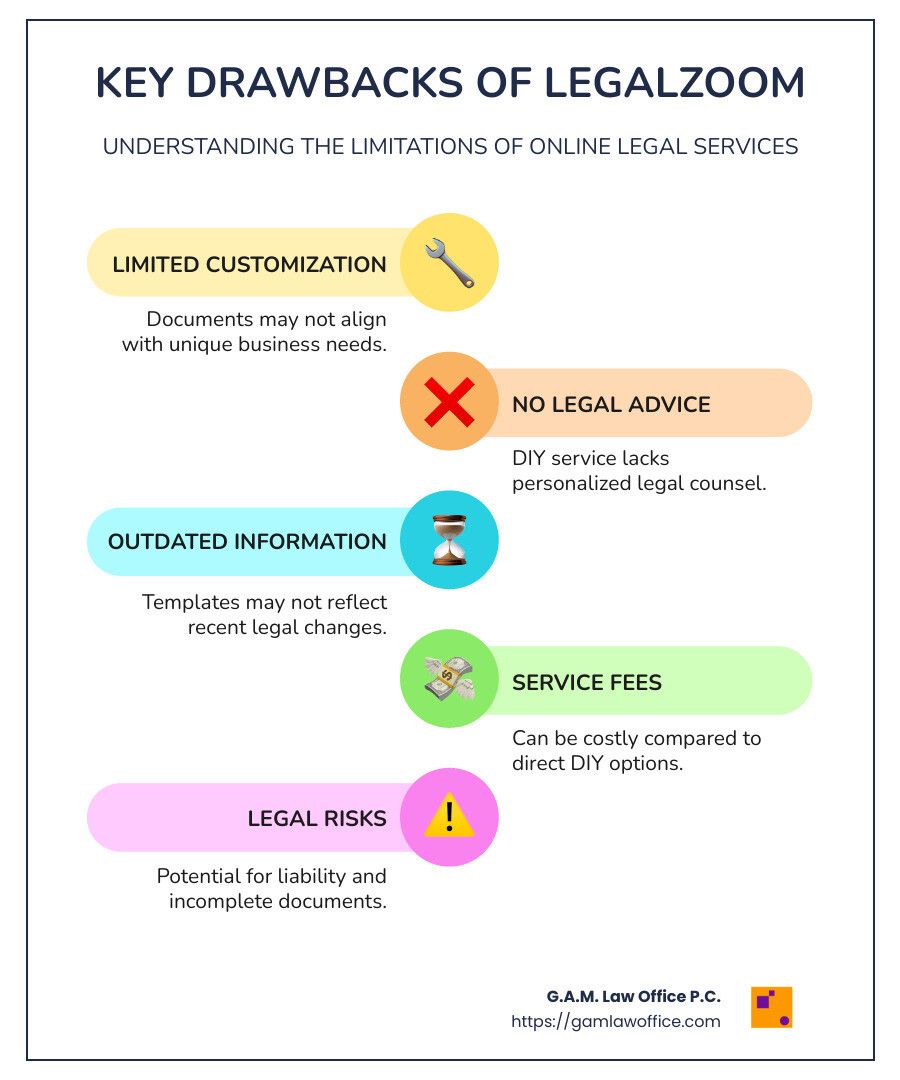- within Intellectual Property topic(s)
- within Wealth Management topic(s)
When considering online legal services, understanding the potential drawbacks is crucial for anyone looking to secure affordable and accessible legal support. Online platforms offer a wide range of standard legal forms and services suitable for small businesses, entrepreneurs, and individuals. However, it's important to weigh these offerings against some of the known pitfalls.
Quick Summary of Online Legal Service Drawbacks:
- Limited Customization: Documents may not meet the unique needs of all businesses.
- No Legal Advice Provided: These are primarily DIY services without the benefit of personalized legal counsel.
- Potential for Outdated Information: Changes in law may not be timely reflected in templates.
- Service Fees Can Add Up: Some basic services are costly compared to direct DIY options.
With the rise of digital solutions, online legal services have become an attractive and convenient alternative to traditional law firms. The promise of swift, cost-effective solutions for tasks like business formations, intellectual property protection, and estate planning draws many users. Yet, the simplicity and accessibility of these platforms are often accompanied by limitations that could lead to significant legal risks.
Understanding the drawbacks and limitations of online legal platforms helps ensure informed decision-making, especially for those in creative fields or startups. These insights are crucial for any emerging business leader who needs to balance entrepreneurship with legal compliance.

Understanding Online Legal Services
In today's digital world, online legal services have become a popular solution for many individuals and businesses. These platforms offer a wide range of legal documents and services, making it easier for users to handle legal matters without stepping into a law office. But how do these services actually work, and what should you be aware of?
Digital Platforms
Online legal services operate through digital platforms that provide users with access to various legal documents and resources. These platforms are designed to be user-friendly, allowing individuals to steer through legal processes with minimal hassle. For example, many online services offer features like business formation, trademark registration, and will drafting, all accessible through their websites.
However, while the convenience is undeniable, it's important to recognize that these platforms are not a substitute for personalized legal advice. Many of these services clearly state that they are not law firms and cannot provide legal advice, which can be a significant limitation for users who need customized legal solutions.
Document Templates
One of the main features of online legal services is the use of document templates. These templates cover a wide array of legal needs, from business contracts to estate planning documents. For many users, this can be a quick and efficient way to obtain the necessary paperwork.
Yet, the reliance on standard templates can be a double-edged sword. These documents are often generic and may not cater to the specific nuances of a user's situation. As pointed out in the research, using templates without customization can lead to inadequate legal protection, especially for businesses with unique needs.
User Experience
The user experience on these platforms is typically designed to be straightforward. Users are guided through a series of prompts and questions to generate the legal documents they require. This streamlined process is appealing for those who prefer a DIY approach to legal matters.
However, this simplicity can come at a cost. The lack of personalized interaction means that users might miss out on critical legal insights that a professional attorney would provide. For instance, when forming a business, users might not realize the need for additional documents or services, such as a registered agent, which could leave their business exposed to legal risks.
In conclusion, while online legal services offer a convenient and affordable way to handle legal matters, it's crucial to understand their limitations. The absence of personalized legal advice and the potential for outdated information in templates are significant drawbacks. For those with complex legal needs, consulting with a qualified attorney may still be the best course of action.
Drawbacks of Standard Online Legal Services
When it comes to online legal services, convenience is key, but this convenience often comes with drawbacks that users need to be aware of.
Standard Templates
Many online legal services offer a variety of document templates for different legal needs. These templates are designed to cover a wide range of situations with a one-size-fits-all approach. While this can be useful for straightforward cases, it becomes a significant limitation for more complex legal scenarios.
Standard templates may not address the unique aspects of your situation. For example, a business contract template might not include specific clauses that are crucial for your industry. This lack of customization can lead to incomplete or inadequate legal protection.
Lack of Customization
Customization is crucial in legal matters, as each case can have its own specific requirements. Unfortunately, online platforms usually do not offer the level of customization that a dedicated attorney would provide.
Without custom advice, users might miss out on key legal nuances. For instance, when forming a business, you might not be informed about necessary additional documents or services, like those needed for registered agent services. This could expose your business to potential legal risks.
Service Disclaimers
Another important aspect to consider is the service disclaimers that online legal platforms provide. These platforms often clearly state in their disclaimers that they are not law firms and cannot offer legal advice. This means that while you can access legal documents, you won't receive any guidance on how to use them effectively.
This disclaimer also absolves these services from responsibility for any errors or outdated information in the documents they provide. Users are essentially on their own if they encounter issues, which can be problematic if the documents are challenged in court.
In summary, while online legal services provide a convenient way to access legal documents, the lack of customization and reliance on standard templates can be significant drawbacks. Additionally, service disclaimers limit the responsibility of these platforms, which can leave users without recourse if issues arise. For more complex or unique legal needs, consulting with a professional attorney is often the best approach.
Limitations of Online Legal Services
Online legal services offer a convenient way to access legal documents. However, there are significant limitations that users should be aware of.
No Legal Advice
One of the biggest limitations is that online legal services cannot provide actual legal advice. These services are not law firms and do not offer legal counsel. This means users won't get personalized guidance or insights that a lawyer would provide. For instance, if you're forming a business, you might not be aware of all the implications of your choices or the additional protections you need.
No Attorney-Client Relationship
Using online legal services does not establish an attorney-client relationship. This is crucial because it means you won't have the confidentiality and legal protections that come with such a relationship. These services are prohibited from offering advice or opinions about legal remedies, defenses, rights, or options. This leaves users without the benefit of a lawyer's expertise to steer complex legal issues.
These limitations highlight why online legal services may not be suitable for everyone. For those with more complex legal needs or unique situations, consulting with a professional attorney is often the best course of action.
While online legal services offer convenience and accessibility, they come with certain risks that users should consider carefully. These risks can have serious implications for your legal and financial well-being.
Legal Consequences and Liability
Another major risk is the potential for legal consequences if the documents you obtain are challenged in court. Online legal service providers often include disclaimers stating they are not responsible for any errors in the documents provided. This means if your document is incorrect or incomplete, you could face legal actions that you are unprepared to handle. Hiring a lawyer to defend a document you didn't draft can be costly and time-consuming.
Additionally, without a lawyer's oversight, you might overlook critical legal nuances. For instance, a poorly drafted agreement might inadvertently give an investor excessive control over your business, which can lead to significant liability and financial loss.
Incomplete Documents
Another risk is receiving incomplete documents that do not fully address your legal needs. Many online services do not review users' answers for legal sufficiency. This means that the documents you receive might lack essential components or clauses, which could leave you unprotected. For example, if you're filing for a trademark, missing information could delay your application or result in its rejection.
Moreover, the reliance on standard templates can lead to documents that are not custom to your specific situation. This lack of customization can be problematic, particularly for businesses with unique legal needs. An attorney would typically ensure that all necessary provisions are included to safeguard your interests.
Outdated Information
Online legal services also warn that the legal information on their sites may not be up-to-date. Laws change frequently, and using outdated documents can have serious repercussions. For example, if your business documents do not comply with the latest state regulations or case law precedents, you might face penalties or legal challenges. Keeping up with these changes is crucial, and a professional attorney is better equipped to provide current and comprehensive legal advice.
These risks underscore the importance of understanding the limitations of online legal services. For those with complex legal needs, consulting with an experienced attorney is often the best way to ensure that your legal documents are accurate, complete, and custom to your specific circumstances.
What are the main drawbacks of online legal services?
Online legal services promise convenience and affordability. However, several drawbacks should be taken into account. One significant issue is the lack of customization. These services often rely on standard templates, which may not address the unique legal needs of your situation. This can lead to gaps in protection and unforeseen legal challenges.
Moreover, there's a risk of deceptive practices. Users might assume they are receiving comprehensive legal advice, but these platforms clearly state they are not substitutes for professional legal services. This misunderstanding can lead to inadequate legal protection.
Why might online legal services not be suitable for my business?
If your business has unique legal requirements, relying solely on online legal services might not be the best choice. These platforms often provide one-size-fits-all solutions, which may not consider the specific nuances of your business. For example, a startup might need custom legal solutions to address specific investor agreements, intellectual property concerns, or compliance regulations.
A business attorney can offer custom advice and draft documents that reflect your business's unique needs. This personalized approach helps ensure that all potential legal issues are addressed comprehensively.
What are the legal implications of using online legal services?
Using online legal services can have significant legal implications. One major concern is liability. If a document drafted through an online service is challenged in court, you are responsible for any errors or omissions. These services often include disclaimers that make it clear they do not provide legal advice or representation, leaving you to handle any legal disputes on your own.
Additionally, without an attorney-client relationship, you lack the protection and guidance that a lawyer provides. This can be particularly problematic if your documents are outdated or incomplete, as you might not be aware of recent legal developments that could impact your case.
In summary, while online legal services offer a level of convenience, they come with risks that can have serious legal consequences. For complex legal needs, consulting with a qualified attorney ensures you have the legal representation and protection necessary to steer potential challenges.
The content of this article is intended to provide a general guide to the subject matter. Specialist advice should be sought about your specific circumstances.


